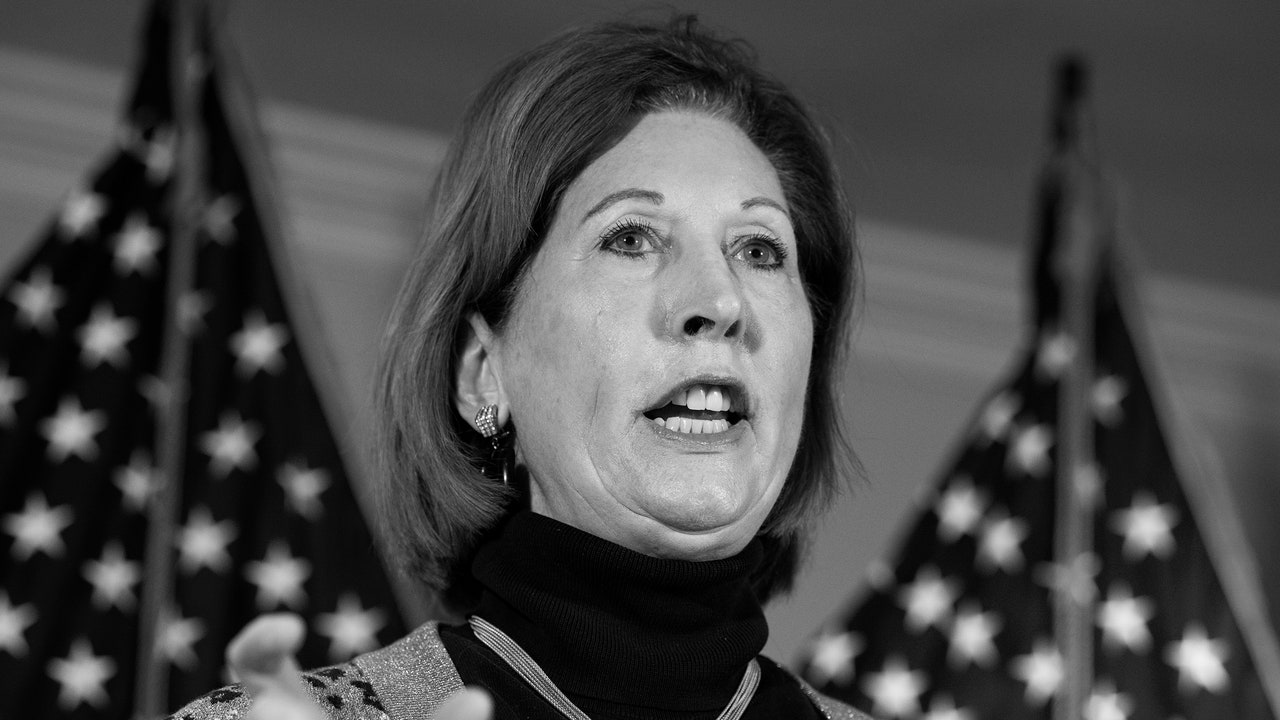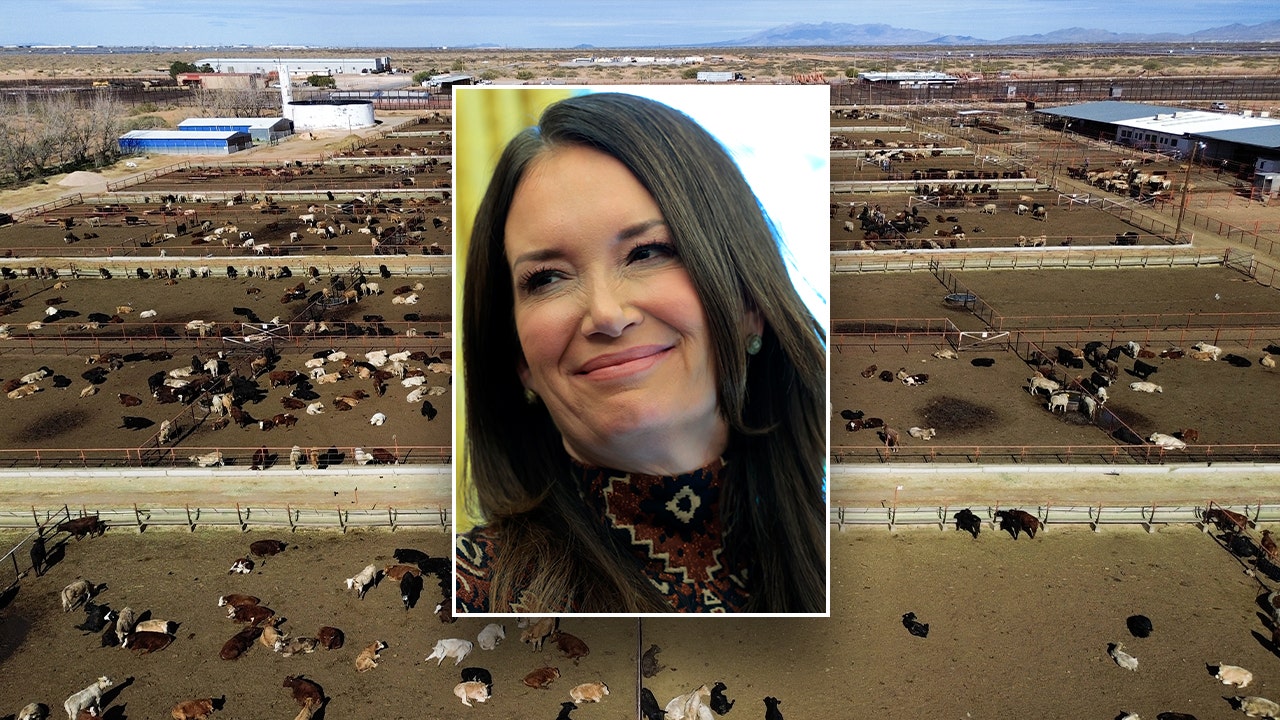South
Why Did Sidney Powell Plead Guilty?

A few years ago, Sidney Powell, a former federal prosecutor and the author of the book “Licensed to Lie: Exposing Corruption in the Department of Justice,” was probably best known as a critic of the Mueller probe into Russia’s meddling in the 2016 Presidential election. After Michael Flynn, Trump’s former national-security adviser, pleaded guilty to the felony of lying to the F.B.I. in the course of that investigation, she publicly urged him to retract the plea; Flynn fired his lawyers and hired her instead. Donald Trump praised the decision. “General Michael Flynn, the 33 year war hero who has served with distinction, has not retained a good lawyer, he has retained a GREAT LAWYER,” he wrote on Twitter, wishing them both luck. Ultimately, however, Powell’s legal prowess was not required: Trump pardoned Flynn in November, 2020, rendering the case moot.
By then, Powell, along with Trump, Flynn, and others, had a new cause: proving that the 2020 Presidential election had been stolen. Powell appeared on Fox News and insisted that the Dominion Voting Systems elections software, used in more than half the country, had been manipulated. “They were flipping votes in the computer system, or adding votes that did not exist,” she said. She repeated the claim later that November, during an infamous press conference at the Republican National Committee headquarters, in Washington, D.C. Rudy Giuliani and Jenna Ellis, another Trump attorney, stood behind Powell as she claimed that Dominion’s software “can set and run an algorithm that probably ran all over the country to take a certain percentage of votes from President Trump and flip them to President Biden.” She added, “Why it was ever allowed into this country is beyond my comprehension, and why nobody has dealt with it is appalling.”
In rural Coffee County, Georgia, three and a half hours southeast of Atlanta, at least a few employees of the election office agreed. After a recount of Georgia’s votes was completed, on December 4th, the county’s elections supervisor, Misty Hampton, refused to certify the results, saying that the machines were unreliable. Days later, a local news outlet posted a video on YouTube in which Hampton is seen demonstrating how the machines could supposedly be used to flip votes. The video presented a potential source of evidence for Powell and others advancing claims of a Dominion conspiracy. But they would need to access the county’s voting software to find any smoking guns.
On January 7, 2021, the day after a right-wing mob stormed the Capitol building, several people paid a visit to the Coffee County elections office. A year and a half later, the Georgia Bureau of Investigation began formally looking into allegations that “computer trespass” had taken place that day. The delay seems to have been due to resistance from the Georgia secretary of state’s office, which, for months, denied that a breach had occurred. “There’s no evidence of that—it didn’t happen,” Gabriel Sterling, a top official with the office, said, in April, 2022. (When asked about the delay by The New Yorker, a spokesperson for the office said, “We took decisive action to address it and give voters peace of mind once we had solid evidence. Misty Hampton is no longer the elections director and all elections equipment has been replaced.”) As the secretary of state deflected, an elections-watchdog group, the Coalition for Good Governance, obtained discovery rights and began issuing subpoenas. The group’s computer-forensics expert confirmed that Coffee County’s elections server had been breached. The chair of Georgia’s state-elections board at the time, a former federal judge named William Duffey, pushed, more than once, for the F.B.I. to get involved. But the agency punted, deferring to the G.B.I., despite the smaller agency’s modest resources and inability to cross state lines.
A year after the G.B.I. investigation began, Powell and eighteen others, including Donald Trump, were indicted elsewhere in Georgia, in Fulton County, as co-conspirators under the Georgia Racketeer Influenced and Corrupt Organizations Act (RICO). Fulton County’s prosecutor, Fani Willis, aims to prove that there was collusion to overturn the outcome of the 2020 election. Powell, who was charged with seven felonies and was facing up to twenty years in jail and six-figure fines, demanded a swift trial, which would have allowed her to get ahead of evidence likely to come out later, when others are tried. But, on Thursday, in a surprise move, she pleaded guilty to six misdemeanor counts of intentional election interference. She will have to pay nearly nine thousand dollars in fines, be on probation for six years, and testify on behalf of the prosecution if called upon; she also has to write a letter of apology to the people of Georgia. Her plea stems from her apparent culpability in the theft and dissemination of voting-machine software, election data, and ballots in Coffee County.
The New Yorker recently obtained a copy of a nearly four-hundred-page summary report produced by the G.B.I., detailing the Coffee County scheme, which has not been made public. The report, much of it relying on information gathered by the Coalition for Good Governance, offers a fuller picture of both the breach at the election office and how that breach was connected to the larger effort to overturn the 2020 election. That effort centered on the work of Sidney Powell.
In mid-November, 2020, Powell travelled to Tomotley Plantation, in South Carolina’s Low Country, a sprawling property owned by the attorney Lin Wood. (Wood has since surrendered his Georgia law license.) Like Powell, Wood filed numerous lawsuits seeking to keep Trump in office after the 2020 election, including an emergency motion asking for access to voting machines in Georgia, which was denied. Powell served as Wood’s co-counsel in that case. In a hearing, she argued that “a two-year-old can hack these machines,” and claimed that she had “at least three teams of experts that could be dispatched to collect the information from the machines,” if the court would let them. An attorney representing the Georgia secretary of state’s office described this as an attempt to “get the proverbial keys to the software kingdom,” insisting that it was something “no federal court can possibly countenance.”
At Tomotley, Powell and Wood were joined by Doug Logan, the C.E.O. of an election-auditing company called Cyber Ninjas, which is now defunct. Also present were Michael Flynn and Jim Penrose, a former analyst at the National Security Agency. Along with Wood, Logan, Flynn, and Penrose—none of whom responded to requests for comment—are among thirty unindicted co-conspirators in Willis’s case. Wood’s guests took over a living room and a sunroom, where they erected a whiteboard and set up computers. Flynn stuck around through Thanksgiving; Logan stayed through Christmas. The G.B.I.’s report describes Tomotley as “the central hub for the voter fraud information processing.” Wood was tweeting a lot from Tomotley during this time. “I have worked closely with @SidneyPowell & others over recent weeks,” he wrote, on November 24, 2020. “The lawsuit Sidney will be filing tomorrow in GA speaks TRUTH.” One by one, all of his and Powell’s suits were deemed meritless. But they did buy time and keep the stolen-election conspiracy alive among Trump’s base while the Tomotley brain trust pursued other paths.
Soon after the Tomotley gatherings began, Powell hired a data-services firm called SullivanStrickler. The firm has insisted that it is “politically agnostic,” and it has not been charged with any wrongdoing, but at least one of its top employees was an outspoken election denier. Days after the election, Greg Freemyer, the firm’s head of research and development, answered a question on the Web site Quora: “Why is the 2020 U.S. vote tabulation process taking multiple days?” His response began, “Quality fraud takes time.” (Freemyer did not respond to a request for comment.) At Powell’s behest, SullivanStrickler initially went to Clark County, Nevada, after the judge in a case brought by another lawyer for Trump issued a limited order that allowed access to testing equipment and programs. (In the end, the judge allowed them to look at only equipment-testing reports generated before the election.) The firm then turned to Antrim County, Michigan, where a judge had ruled that the Trump legal team could make forensic images of vote-counting tabulators. The judge explicitly barred the “use, distribution or manipulation of the forensic images” without a further court order. Nonetheless, on December 6, 2020, SullivanStrickler’s chief operations officer, Paul Maggio, e-mailed Powell and Penrose to say that the Antrim files would be available for download once the company was paid. (The lawyer who brought the Michigan case, Matthew DePerno, was indicted this summer and charged with undue possession of a voting machine, willfully damaging a voting machine, and conspiracy—for his participation in a scheme where voting machines were taken from election offices, brought to motels and rental apartments, and disassembled, in an effort to uncover fraud. He has pleaded not guilty.)
A month later, Penrose asked Powell to pay for SullivanStrickler to go to Coffee County to make copies of voting-machine software and election data. A retainer agreement sent by SullivanStrickler, covering one day of work in Coffee County by four employees, said that the firm was owed twenty-six thousand dollars; Powell paid the firm through her nonprofit legal-advocacy group, Defending the Republic. According to testimony in the G.B.I. report, SullivanStrickler’s work in Coffee County was managed by Maggio and Powell. The document also reveals that SullivanStrickler “did not do any type of independent due diligence to ensure the legality of their work,” because, according to a company executive, “the majority of SullivanStrickler’s customers were lawyers, who are officers of the court and as such, the affirmation in the agreement indicating the proper authority for the proposed work was suitable.” In other words, it was the responsibility of the client—Sidney Powell—to insure that the work was legal.
On December 30th, Rudy Giuliani and Cathy Latham, the chair of the Coffee County G.O.P., testified before the Georgia legislature about alleged problems with Dominion machines. Both were represented at that hearing by an Atlanta lawyer who, the following day, sent an open-records request to Misty Hampton asking for all of Coffee’s absentee ballots. Hampton’s response set in motion SullivanStrickler’s arrival in the county to copy the election software and data. “Per the Ga law I do not see any problem assisting you with anything yall need accordance to Ga. law,” she wrote, on December 31st. “Yall are welcome in our office anytime.” (Hampton, Giuliani, and Latham have all been indicted in the RICO case and have pleaded not guilty.)

Dallas, TX
Cowboys’ roster winners and losers from surprisingly defense heavy draft

The 2025 NFL Draft has concluded, with the Dallas Cowboys making nine picks. Originally scheduled for ten, the Cowboys went into day three with the bulk of their picks still remaining, and did some wheeling and dealing to move up in the fifth round and target even more defensive help with Florida linebacker Shemar James. Day three was also the point the Cowboys waited until to address running back, which came as a surprise, but they double-dipped with Texas’ Jaydon Blue at 149th overall and Clemson’s Phil Mafah at 239th in the seventh.
The single biggest surprise from this Cowboys draft is that they left wide receiver completely untouched. Some runs on the position ahead of their picks in each round may have forced their hand here, but Dallas did a terrific job sticking to their board and finding high-value players, mainly by trusting first-year DC Matt Eberflus to bulk up his side of the ball. Both of the Cowboys day two picks went to defense, as well as three of their six on day three with another double-dip at defensive tackle in the seventh. Jay Toia and Tommy Akingbesote became something of last-ditch picks to address an underrated position of need, at very least from a depth and bodies standpoint, giving the Cowboys more size on the defensive interior.
One of the great initial things to seemingly come out of this draft is also the way the Cowboys created competition. The Cowboys newest rookies will push existing depth players to the roster bubble, especially those that were brought in under previous coaches, almost none of which are still here. The Cowboys also have some clear winners from the existing roster who seemingly got a vote of confidence based on the team’s drafting.
Let’s take an early look at who some of these Cowboys’ roster winners and losers are following the draft.
Winners: WRs Jalen Tolbert, Jalen Brooks, Ryan Flournoy and Jonathan Mingo
The Cowboys positioning in each round did not fall favorably for them to target a receiver with any of their four picks in the top 150. Tet McMillan was gone before their first round choice, Matthew Golden went later in the first, and Luther Burden was drafted before they pivoted to defense in the second round for Donovan Ezeiruaku. There was a total of 20 wide receivers drafted after the Cowboys third-round selection, but by this point the team must have felt none could play right away and make the impact they need. By doing so, the Cowboys put a lot of faith into an existing receiver group that lost Brandin Cooks this offseason. Obviously they could still add a vet WR through free agency or a trade.
The biggest names to keep in mind here are Jalen Tolbert, Jalen Brooks, Ryan Flournoy, and Jonathan Mingo, because they have all been on the roster for part of the time the Cowboys offensive play caller in Schottenheimer has been on staff.
Tolbert has yet to show much over his three years with the team that inspires confidence he can be much more than a third receiver alongside an established primary and secondary option. The Cowboys have their primary target in CeeDee Lamb, and even drafting a receiver 12th overall wouldn’t have changed this, but having to put Tolbert in the current conversation for WR2 is not the best of circumstances. Still, Tolbert emerges from this draft as a winner, at least because he will have a clear path to see the field and find a new role in Schottenheimer’s offense. This is a player that got better with the most consistent reps of his career a year ago, and still fills an obvious need for speed at the skill positions for Dallas.
From the somewhat limited nuggets of information we have about how Schottenheimer wants to scheme the Cowboys offense moving forward, using consistent formations that look the same but present a wide array of concepts to the defense is a priority. This would align the Cowboys closer to teams in the way they help their quarterbacks with these looks. A staple of playing offense in this way is the ability to dictate the matchups receivers, backs, and tight ends get in coverage. If the Cowboys can hone in on this for Tolbert and get his vertical speed working against linebackers and safeties more consistently, it could be the key to seeing the former third-round pick make another leap.
As for both Jalen Brooks and Ryan Flournoy, the Cowboys may not find a lot of dynamic speed and explosive play ability from either, but these are big targets that present wide catch radiuses for Dak Prescott. Both receivers have their best potential in the red zone, where Dallas was 31st in the league only ahead of the New York Giants in scoring touchdowns last season. If using Prescott’s mobility is going to be another focus for the redesigned offense, moving him out of the pocket to layer throws to the likes of Brooks, Flournoy, and even last year’s trade acquisition Mingo, can become bread and butter plays. This is an offense that will have to work hard to create run-after-the-catch situations for their receivers, but has some of the potential to do so on the depth chart.
The Cowboys also ended the draft without making any of the “substantiated” trades Jerry Jones hinted at coming into it, and wide receiver is a position they’ve shown a propensity to target in trades before. Not just with Mingo a year ago, but obviously Amari Cooper in 2018 when things were looking bleak at receiver prior to that trade. Fans may think things are equally bleak on the current depth chart at WR, but at minimum this team has young talent still on the rise in multiple receivers for the first time in a long time, all of which became winners after the draft without a single new rookie to compete with.
Losers: OL Nathan Thomas, T.J. Bass, and Brock Hoffman
When the Cowboys started off their draft with Alabama’s Tyler Booker, one of the benefits was reshuffling the depth chart along the offensive line to put depth players into backup roles and not over-slotted as potential starters. This equation changed a little bit when the Cowboys took yet another versatile offensive lineman in Ajani Cornelius in the fifth round.
Cornelius was a tackle at Oregon, but is expected to move to guard in the NFL. The Cowboys know better than most teams how to get the most out of linemen transitioning from one position to another in the pros, and do so while still valuing them as an option at all of their capable positions. This is why adding both Booker and Cornelius is not the best news for the likes of Nathan Thomas, T.J. Bass, and Brock Hoffman.
Thomas was a seventh-round pick last year, another collegiate tackle that also projects as a big guard at the pro level. The fact the Cowboys are already putting second-year draft picks on the roster bubble shows how serious they were about recommitting to the offensive line. Thomas could have been a longshot to compete for the right guard rotation before the team drafted Booker, and a backup guard option with swing potential before Cornerlius was picked. Now, Thomas will have to compete with a player coming out of a bigger school with higher draft pedigree.
The player who likely fell out of starting job consideration entirely is Brock Hoffman. This is a player that went from having something of an inside track to the right guard job, to at least being the primary backup at two positions with the ability to play center behind Cooper Beebe, and now by the end of the draft will find himself in a fight with the team’s latest fifth-round pick as well as Robert Jones and Saahdiq Charles to remain a primary backup guard. T.J. Bass also finds himself in a battle to be a backup along the interior line.
The Cowboys have not backed down for even a second under Schottenheimer when it comes to their desire to field one of the best offensive lines in the league again, and may have found the pieces to do so in this draft.
Photo by Sam Hodde/Getty Images
Winners: TEs Jake Ferguson, Luke Schoonmaker
The Cowboys proved throughout the draft they were not afraid to address positions that weren’t necessarily considered top needs, but passed on a dark horse way to still upgrade their skill offensively with their very first pick. Penn State tight end and Swiss army knife Tyler Warren was surprisingly still on the board, after the Bears made Colston Loveland the first TE off the board at 10th overall. With Jake Ferguson going into a contract year after having a down year in 2024, the consideration among fans was strong for Warren. Dallas made it clear they are content to go into another season with Ferguson hopefully staying healthy throughout and catching more passes from Dak Prescott, not any of their backup QBs.
When Dallas was down to their backups last season, and Ferguson was unavailable, they actually saw some flashes from second-year player Luke Schoonmaker as well. Schoonmaker has shown flashes of being a reliable check-down option on the types of bootleg or moving pocket throws that could also help the Cowboys receiving corps greatly, as well as a middle of field seam option. The Cowboys also have blocking tight end Brevyn Spann-Ford with room to grow more as a pass catcher. This trio was enough for the Cowboys to pass on Tyler Warren, and LSU TE Mason Taylor went two picks before their second-round choice. This all but shut the door on the Cowboys upgrading significantly at tight end in this draft, leaving the arrow pointing up for both Ferguson and Schoonmaker.
Loser: LB Damone Clark
The Cowboys overhauling their linebacking room prior to the draft via the trade market was bad enough news for Damone Clark, coming off a season where he played a very limited role in Mike Zimmer’s defense. Dallas did not stop at trading for Kenneth Murray and Jack Sanborn though, they also traded up in the fifth-round to draft Florida LB Shemar James. Matt Eberflus’ influence was felt throughout this draft, and when it comes to being the former LB coach for the Cowboys, he has certainly had his way in rebuilding the position group in his image.
:no_upscale()/cdn.vox-cdn.com/uploads/chorus_asset/file/25972291/1693946002.jpg)
Photo by Peter Joneleit/Icon Sportswire via Getty Images
Clark will be one of the few linebackers to play for all three of the recent DCs for the Cowboys in Dan Quinn, Zimmer, and Eberflus, but now more than ever the depth chart is stacked against him with young talent and specific scheme fits. The Cowboys still need additional bodies at the position until DeMarvion Overshown is ready to play this season, which may not happen at all, but Clark will have to outperform one of Sanborn, Murray, James, or Marist Liufau to really find a consistent role on defense.
Winner: DE Micah Parsons
The Cowboys have so many new faces and moving pieces to their defense coming out of this draft, it is almost possible to forget that Micah Parsons is still the star the rest of this entire unit revolves around. Parsons never stopped playing hard for a team out of contention last season, and has been rewarded this offseason with a completely retooled defensive front that should help him thrive in all of the ways he knows how to.
The Cowboys took another pass rusher in the second round with Donovan Ezeiruaku. They’ve added athletic rushers Payton Turner and former Cowboy Dante Fowler Jr. to the group this offseason as well. Sam Williams is set to return after missing all of last season with an ACL and MCL tear. The ability for all of these players to interchange and rush from different positions could be a nightmare for opposing offenses to deal with at the line of scrimmage.
The Cowboys must do everything they can with the rest of the offseason to embrace their pass rush stable being one of the brightest spots on the whole roster, and find ways to maximize their ability to impact the game. Being a great ball control team offensively would go a long way here, and Dallas certainly has their work cut out figuring out what combination of Miles Sanders, Javontae Williams, Deuce Vaughn, Jaydon Blue, and Phil Mafah out of the backfield can help them achieve this.
The Cowboys are in great position to get another all-world season out of Micah Parsons. While this may have been true before the draft, considering we are talking about Micah Parsons here, the way they continued to focus on the front seven and helped Parsons even more was somewhat unexpected – but absolutely welcome.
Miami, FL
1 hospitalized after boat collides with docked vessel in North Miami waterway, officials say

One person was transported to the hospital after a boat crash at North Miami Beach on Saturday evening, Miami-Dade Fire Rescue confirmed.
At about 8 pm. in the Eastern Shores community, near NE 17th Street and 35 Avenue, MDFR crews, including air rescue, responded to a report of a capsized vessel.
Video from a nearby home shows a small boat colliding with a docked vessel along a canal. The crash caused the boat to flip over, sending several people into the water, MDFR said.
Divers were deployed in the water, and officials said all individuals on board the capsized vessel were accounted for on Saturday.
One adult was transported by ground to a local hospital. The extent of their injuries has not been confirmed.
Authorities are still working to determine the cause of the crash, and no further details have been released.
This remains an active investigation.
Atlanta, GA
2025 NFL Draft Grades: How the Atlanta Falcons fared

FLOWERY BRANCH, Ga. — The Atlanta Falcons made all of their selections in the 2025 NFL Draft, building a class that consists nearly entirely of defenders.
Defense has been a focus for the Falcons all offseason, and the draft represented the latest opportunity for improvement. Head coach Raheem Morris and general manager Terry Fontenot expressed their excitement for Atlanta’s selections throughout the weekend.
The draft pundits were a bit more mixed on the Falcons’ haul, with most of their reservations linked to the 2026 first-round pick Atlanta gave up to move back into the first round to select James Pearce Jr. Fontenot discussed that move over the weekend, saying their belief in the player outweighed the value of a pick next year.
“Well, if you look at the trade from yesterday, basically what we did is we used our first round pick this year, right? When you really think about it, what we gave up for it is we went from the second round to the third round, if you really put it in a nutshell. …
“It’s about who the player is, and we’re not being irresponsible about it. We’re making decisions based on conviction and love for players and knowing the impact they’re going to make on this team.”
The first-round value Atlanta gave away in 2026 will be tied to the team’s performance this season. If the Falcons make the jump and achieve their goal of reaching the postseason, that first-round pick would be closer to the No. 26 pick they received in the trade and the value would therefore look more equal.
Interestingly enough, NFL data analyst Warren Sharp declared that Atlanta came away with the best value in the entire draft, despite the claims that the Falcons gave away too much to get the players they did. If that value translates to the field, Atlanta’s class will likely rise in estimation.
-

 Education1 week ago
Education1 week agoRead the Letter From Kristi Noem to Harvard
-

 Science1 week ago
Science1 week agoA 'calamity waiting to unfold': Altadena residents with standing homes fear long-term health effects
-

 Education1 week ago
Education1 week agoVideo: Shooting at Florida State University Leaves 2 Dead and 6 Injured
-
News1 week ago
Harvard would be smart to follow Hillsdale’s playbook. Trump should avoid Biden’s. | Opinion
-
Business1 week ago
Porto's Bakery moving forward in Downtown Disney, replacing Earl of Sandwich
-

 Politics1 week ago
Politics1 week agoSupreme Court blocks new deportations of Venezuelans in Texas under 18th century Alien Enemies Act
-

 Politics1 week ago
Politics1 week agoTrump admin imposes sanctions against Bank of Yemen for supporting Houthis
-

 News1 week ago
News1 week agoThe NHL Stanley Cup Playoffs begin Saturday. Here's what to watch for


















